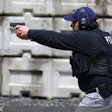As the details about Thursday's Taft Union High School Shooting are coming to light, we're learning that two brave school staff members, teacher Ryan Heber and school counselor Kim Lee Field, were able to distract the shooter long enough so that the rest of the students in Heber's class could escape the room unharmed. Heber and Field were then able to convince the suspect to hand over his weapon.
I don't know if either of these individuals have ever received any type of training on how to verbally de-escalate incidents, but it sure sounds like they knew what they were doing. It also helped that the alleged shooter and Heber, a popular teacher on campus, appear to have had an amicable relationship.
The Taft Union High School shooting demonstrates the importance of providing training to campus teachers, staff and public safety officers on verbal de-escalation.
Unfortunately, according Campus Safety Magazine's most recent opinion survey, a significant percentage of these individuals are not receiving enough training on workplace violence or on how to safety restrain individuals who are harming or might harm themselves or others.
University and school administrators must train all of their employees on these life-saving techniques. The following articles, which have appeared in Campus Safety over the past several years, provide some basic guidance.
- Responding to Abusive Patient Behavior: 10 Ways to Defuse Incidents
- Responding to Abusive Patient Behavior: 3 Pitfalls to Avoid When Training Staff
- Responding to Abusive Patient Behavior: Reducing the Risks of Restraints
- How to Manage Students With Behavioral Issues
- 8 Verbal Indicators of Violence
- How to Identify Nonverbal Indicators of Violence
Robin Hattersley Gray is the executive editor of Campus Safety Magazine, a sister publication of POLICE Magazine.















